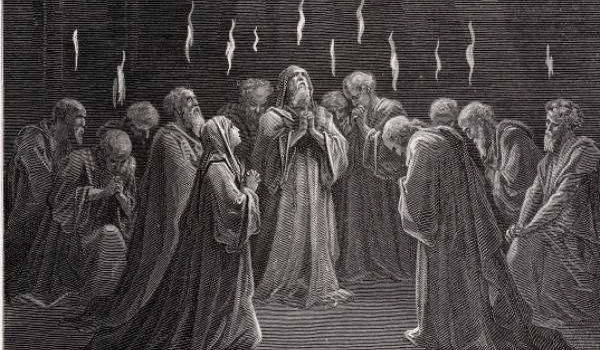Everything You Wanted to Know About Pentecost (and More)
This post is adapted from a series I did on my personal blog last year. You can check it out in it’s entirety here.
Leviticus 23:15-22; Deuteronomy 16:9-12; Numbers 28:26-31; Exodus 23:16
The Feast of Weeks. Pentecost. Shavuot
The name of Shavuot means “weeks,” coming from the seven weeks that were to be counted after Passover. Greek-speaking Jews would have called the feast Pentecoste, meaning “50 days,” which is where we get the English word “Pentecost.” This feast was based on God’s command that a special offering of fresh grain was to be made on the 50th day after Passover Sabbath.
Pentecost was unique, because it was one of only three times per year that all God’s people were to pilgrimage to the Temple in Jerusalem. As God had met the Israelites on the “mountain of God” (Ex. 24:13). On Pentecost, he met them on the Temple Mount, “the mountain of the Lord” (Isa. 2:3, 66:20). Temple attendance was required at Passover (Pesach), Pentecost (Shavuot), and Booths/Tabernacles (Sukkot). During these feast days, those from around the world who were obedient to Yahweh went Jerusalem.
This means that a great crowd of sojourners would gather in the Temple courts during the morning service at the Temple. While the offerings and sacrifices were being made, portions of the Old Testament were read aloud. According to Jewish tradition, it was Exodus 19-20 (The giving of the Torah on Mount Sinai) and Ezekiel 1-2 (Ezekiel’s vision of God appearing in fire and wind).
Some time before the birth of Jesus, the rabbis determined that Pentecost was the time when the Torah had been given to Moses on Mount Sinai. There is some biblical basis to indicate that the rabbis were right.
Pentecost is celebrated 50 days after Passover in the third month of Sivan. The exiles from Egypt reached Mount Sinai “in the third month” (Ex. 19:1). Since the feasts of Passover and Booths/Tabernacles were linked to the Exodus, it would stand to reason that the third festival that required pilgrimage would be as well. At the very least, the giving of the Law occurred in the third month which is when Pentecosts was celebrated. What makes me think the rabbis were onto something is a clear teaching in the Torah (and reiterated by Jesus). God taught that “man does not live on bread alone” (Deut. 8:3). It would make sense that during a grain harvest to simultaneously celebrate the God who not only gave us bread but also His very Word.
Now that we have a basic understanding of the festival, try and think back to that first Pentecost celebrated by the disciples of Jesus after his death and resurrection. Remember, Jesus had returned to heaven 40 days after his resurrection, a short 10 days before this feast. Interestingly, he made it a point to tell his disciples to obey the Torah by not leaving Jerusalem and in their obedience, he would send the Comforter, the Holy Spirit that he promised. Keep in mind, Jesus had made this a highly irregular feast season. He had died on Passover, had been buried on the Feast of Unleavened Bread, and had been raised on the Feast of Firstfruits. Hearing Jesus affirm their need to stay for the Pentecost celebration must have fostered great expectations for the upcoming festival.
When the day of Pentecost (Shavuot) came, the disciples were together in “one place.” Many Christians assume that the “place” was the upper room that Luke refers to earlier in Acts 1:13. However, I believe that there is a significant amount of evidence that indicates that the “one place” was in or just outside the Temple. Though it’s next to impossible to place the exact location, there is reasonable evidence to suggest that you should consider a name change if you are a part of some type of “Upper Room” ministry.
As I mentioned, attendance was required in the Temple for all Jews on this festival. The disciples, who were told by Jesus to wait in Jerusalem (i.e. attend the festival) and who were also continually in the temple courts (Luke 24:53), would have most certainly been in the Temple on that day at this time also. After the Spirit descends, great crowds heard their own tongue spoken and listened to Peter as he preached. Where would great crowds of foreign Jewish pilgrims have been on a holy feast day at the time of Temple service? Without a doubt, they would have been in the Temple because this was where the Pentecost rituals were performed. Scholars believe the events in Acts 2 occurred at the great staircase at the south entrance of the Temple. This is the way that many of the foreign pilgrims would have been entering to worship and the miraculous event in Acts 2 was pilgrims hearing Judeans speaking their language.

Either of these two locations fit the descriptions given in Acts 2 of a large foreign crowd. It was common for sojourners to enter from the south and go into Solomon’s Portico.
Not only so, but Peter tells us that it was 9 am. This is when the religious ceremonies were taking place. Where else would these faithful Jews be except at the Temple? Some scholars believe that 9 am was actually when the selected passages that I referred to earlier were read. Intriguingly, the passage from Exodus describes the appearance of God on Mount Sinai (i.e. thunder, lightning, fire, and smoke) and the passage from Ezekiel recounts his vision of God’s appearance (i.e. sound of wind and with fire).
Unfortunately, we have conflated the terms “upper room” (where the disciples and others are gathered in Acts 1) and “whole house” (the place where the Spirit falls in Acts 2). “Upper room” is mentioned by Luke in his gospel (and Mark in a parallel passage) when referring to the place where Jesus and the disciples shared the Passover meal (Luke 22:7-14, cf. Mark 14:12-17). Outside of the Acts account, those are the only two other instances of the use of “upper room” in the New Testament. However, each time it is used, the author makes it a point to tell us who is in the room including in the Acts account (Acts 1:13-14; Lk. 22:14; Mk. 14:17). This couldn’t possibly be the place Peter preaches to great crowds with 3,000 saved. Additionally, Luke makes it a point to call the Temple God’s “house” in both his Gospel (2:49, 6:4, 19:46) and in Acts (7:47). It seems that these are two different places.
And what happened after Peter preached? Not only were 3,000 saved, but they were baptized at Peter’s command as a response. Near the great staircase at the southern “pilgrim” entrance to the Temple, there were baths (mikvot) that were used by the Jews so they could be ceremonially clean before they entered the Temple. As you know, Judea gets very little rainfall so there would not have been many places in the city of Jerusalem with enough water to baptize that many people. They would have had to leave the city and make their way to the Jordan River. But, if these events took place at the Temple (possibly even at the southern staircaise) these pools, which already symbolized the washing away of uncleanliness before God, would have been logical places to perform 3,000 baptisms.
Why does all this matter? Who cares if they were in the upper room or at the Temple?
First of all, I think we do an overwhelming disservice to the disciples when we put them alone and oftentimes scared in the upper room waiting for the Spirit to descend. Certainly the Spirit gave them a boldness that they didn’t have prior, but we mustn’t assume that just because they weren’t boldly proclaiming the Gospel that they were scared or hiding or afraid. Jesus simply told them to wait (Acts 1:4) and they had only been alone without him for 10 days. Don’t wussify the disciples more than they deserve.
Secondly, and I believe most importantly, when we strand the disciples in an upper room away from everyone else in a holy huddle, we miss the point of the story. When people are asked, “What’s the point of Acts 2?” the answer is almost always, “Speaking in tongues.” NO! And the more we make it about that, the more we miss the point. The point of the events in Acts 2 is that the disciples praised God in the languages and tongues of those foreign Jews around them. That’s the miracle. That’s the amazing part. It’s God’s Kingdom breaking through into ours. It’s His revelation into what it’s really like. It isn’t limited by language or ethnicity or geopolitical boundaries or anything of the sort. It is wide and vast and expansive and includes all people of all tribes and all tongues and all nations.
But when we isolate the first Christians to an upper room all speaking in tongues to themselves, we miss what God is doing. When we remove the disciples from the context of the crowds, who are major players in the story, then there is a sense of purposelessness or ambiguity when it comes to tongues. When we take the disciples away from the crowds and put them in an upper room behind a locked door, the gift of tongues is now free to take on a new meaning outside of what God meant it for in Acts 2 and, consequently, the rest of the Book of Acts. And every time tongues is mentioned in Acts, it’s always about breaking down barriers and creating unity in Christ. Every. Single. Time.
Now, if you are a continuationist, which I am not, and believe that the supernatural revelatory gifts of the New Testament (including tongues) are still in operation today, you must come to terms with what is going on in Acts 2. You cannot separate tongues from it’s initial purpose which, in Acts 2, was not to talk to God in a private prayer language. It was not to talk using a language you didn’t understand because you didn’t have the words to say. Notice that tongues in Acts 2 are human languages that are spoken and understood and, like every other language, are used as a tool to communicate the Gospel. If you want to believe tongues is still a practice in the church today, we’ll agree to disagree. But if you do believe that, you have to be consistent and admit that if they are, they must, according to Acts 2, be human languages that are able to be understood with the purpose of drawing people together in unity around the Gospel of Jesus Christ.
Whatever it is you believe about what happens regarding tongues today, I think it’s safe to say that what happened on that particular Pentecost morning surpassed all the disciples’ predictions. God’s Spirit filled them with boldness and gave them power they couldn’t have imagined. Amazingly, that same Spirit regenerated the hearts of about 3,000 people so the newly founded Church of Jesus Christ grew. Those 3,000 came from every nation of the known world and then returned as “missionaries” who didn’t have to spend time learning a new culture or language.
While this event was unexpected, it wasn’t uncharacteristic. The set up was complete. This was just the brilliant “twist” ending that no one saw coming.
As stated previously, the Jews of Jesus’ day believed that Pentecost was celebrated around the time God gave the gift of Torah to Moses. So, in the mind of the participant, the writer, and the reader, these two events would have already been linked.
Both events involved similar sounds and symbols, such as wind, fire, and voices (Ex. 19:16-19; Acts 2:1-3). Both events involved the presence of God (Ex. 19:18, 20; Acts 2:4).
But there is one thing that may not seem as obvious. Recall for a moment what God was doing at Sinai. Recall what God was doing when he gives the Israelites the Torah. Recall the commandment that ties all commandments in the Torah together. “Be holy for I am holy,” (Leviticus 11:44, 45, 19:2, 20:7, 26, 21:8). God’s giving of the Torah at Sinai served to commission Israel into the world as a “kingdom of priests” (Exodus 19:6) charged with representing God to the world. He gave them the Law so that they could reflect his holiness showing the world what He is like.
Recall what God was doing when he called Ezekiel. Ezekiel experienced visions and for a purpose. God was commissioning him as a prophet to proclaim his Word to a wayward people.
On Pentecost in Acts 2, God was publicly commissioning Jesus’ disciples to take the Gospel to the world… to be his representative. The very first thing that Peter does is to preach to the crowds and God saved thousands of people that day. On the first Pentecost at Sinai, God celebrated by shaking the earth with voice as he commissioned his people. In Acts 2, God was celebrating Pentecost again by shaking the earth with his voice, but this time he filled his people with his voice empowering them shake the earth through the preaching of the Gospel.
There is also an interesting thing in the way that Luke records this Pentecost account in Acts 2. I think he is trying to show us that what occurred in Acts 2 was, by Old Testament definition, a true Pentecost.
The requirements for the celebration of Pentecost are given in 4 places around the Old Testament, but one of them has something that none of the others do.
In Leviticus 23, God gave Moses the specifics of this celebration. All of that matches the other accounts. But before moving on to the Feast of Trumpets, there is a somewhat strange verse included with the requirements. Verse 22.
“And when you reap the harvest of your land, you shall not reap your field right up to its edge, nor shall you gather the gleanings after your harvest. You shall leave them for the poor and for the sojourner: I am the Lord your God.”
This echoes a command God gave in Leviticus 19:9 (the “Love Your Neighbor” section of the commandment).
“When you reap the harvest of your land, you shall not reap your field right up to its edge, neither shall you gather the gleanings after your harvest. And you shall not strip your vineyard bare, neither shall you gather the fallen grapes of your vineyard. You shall leave them for the poor and for the sojourner: I am the LORD your God.”
Since Pentecost is a festival that celebrates the harvest, this law isn’t completely out of place. We know that this was adhered to by faithful Jews like Boaz, and we know that poor people like Ruth and Naomi took advantage. So in the mind of a Jew, Pentecost was just as much about serving and helping the poor as it is about the Torah and the harvest.
Look again and Luke’s construction of the story in Acts 2.
The Spirit falls. Language barriers are broken down causing the Gospel to be heard by everyone. Peter preaches, people repent and the Kingdom expands. But that’s not where the story ends. Luke makes it a point to tie something else in (TWICE). I’m not suggesting it didn’t happen, but I’m suggesting that Luke’s inclusion of it should make you clearly see a line connecting the Old and New Testaments.
“And all who believed were together and had all things in common. And they were selling their possessions and belongings and distributing the proceeds to all, as any had need. And day by day, attending the temple together and breaking bread in their homes, they received their food with glad and generous hearts… Now the full number of those who believed were of one heart and soul, and no one said that any of the things that belonged to him was his own, but they had everything in common. … There was not a needy person among them, for as many as were owners of lands or houses sold them and brought the proceeds of what was sold and laid it at the apostles’ feet, and it was distributed to each as any had need.” (Acts 2:44-46, 4:32-35)
The early believers, who were filled with the Spirit, held everything in common and shared with everyone who had need. These people who had experienced the bounty of God’s great “harvest” could not help but be concerned for others, who, in turn, learned about what God was like through the believers’ acts of generosity.
This was a true Pentecost. It wasn’t about tongues or an upper room or jumping and shouting. It was about breaking down ever possible human erected barrier with the Gospel. It was about caring for the poor because God had cared for us. It was about being commissioned by Him to show the world what He’s like.
And it’s still about all those things.










